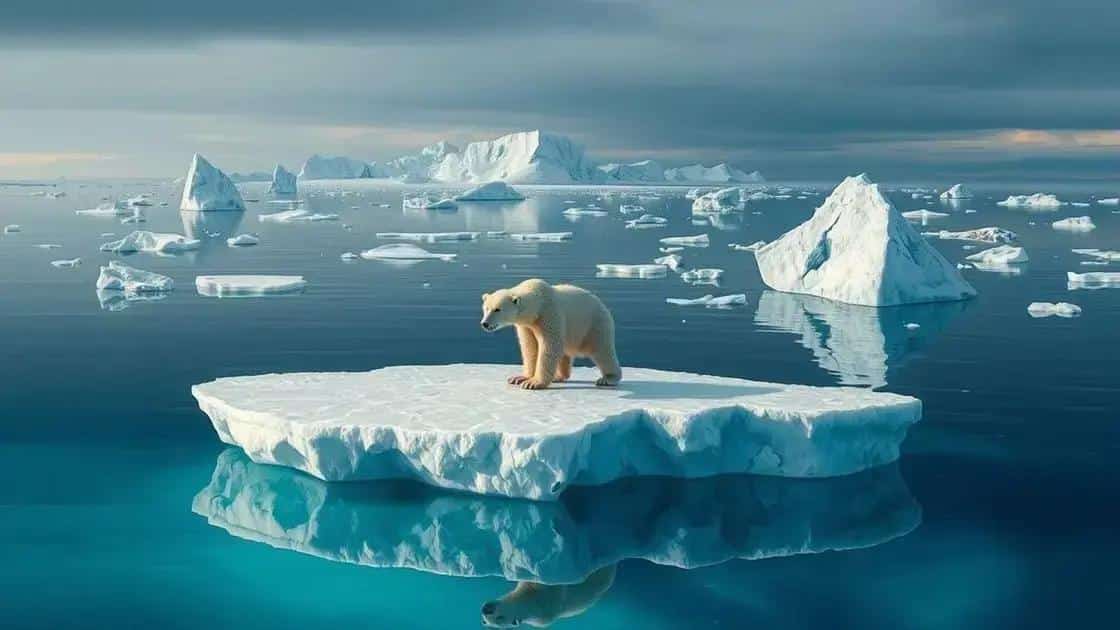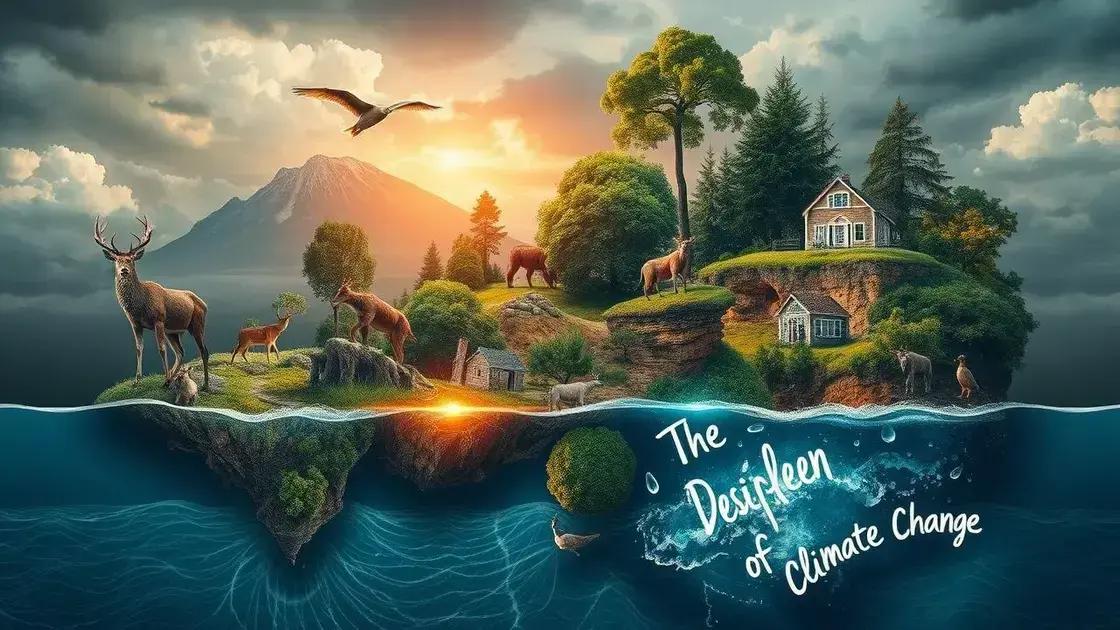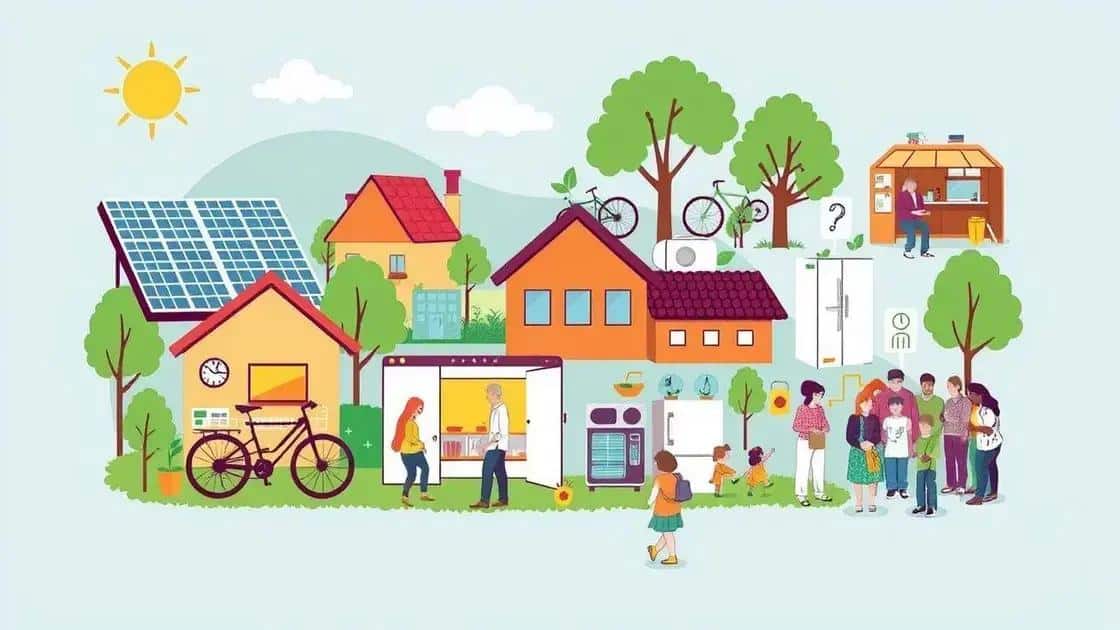Climate change impact: How it affects us all

Climate change impacts human health through increased respiratory issues, heat-related illnesses, the spread of vector-borne diseases, and mental health challenges, making immediate action crucial for well-being.
Climate change impact is something we all hear about, but do we really understand its reach? From extreme weather events to rising sea levels, its effects are becoming more noticeable every day. Let’s explore how this phenomenon touches our lives and what we can do to make a difference.
Understanding the science behind climate change
Understanding the science behind climate change is crucial for grasping its impact on our planet. At its core, climate change refers to long-term shifts in temperatures and weather patterns. These shifts can be caused by natural factors, but human activity has accelerated these changes in alarming ways.
What causes climate change?
Several factors contribute to climate change. The most significant human activities include:
- Burning fossil fuels, such as coal, oil, and natural gas.
- Deforestation, which reduces the number of trees that can absorb carbon dioxide.
- Industrial processes that release greenhouse gases.
- Agricultural practices that contribute to methane emissions.
Each of these factors adds to the greenhouse gas emissions in our atmosphere, leading to the warming of the Earth.
The greenhouse effect explained
The greenhouse effect is a natural process. It allows the Earth to maintain a temperature that can support life. However, with increased greenhouse gases, this effect has been intensified.
Greenhouse gases trap heat in the atmosphere, causing global temperatures to rise. While some warming is necessary for life, excessive heat can lead to detrimental changes in weather patterns.
In turn, these changes can cause more extreme weather events, like storms and droughts. Such events not only disrupt ecosystems but also threaten agriculture and water supplies.
By understanding the science behind climate change, we can better comprehend the urgency of our situation. Scientific research continues to show that our actions today will determine the climate of tomorrow.
It’s key for everyone to grasp the basics of climate science so we can contribute to solutions rather than exacerbating the problem. Staying informed and taking action is vital for securing a healthier planet for future generations.
Key impacts of climate change on our environment

The key impacts of climate change on our environment are becoming increasingly apparent. As global temperatures rise, ecosystems are facing unprecedented challenges. These changes affect wildlife, natural habitats, and even human communities.
Effects on ecosystems
Climate change disrupts ecosystems in various ways. Some major impacts include:
- Habitat loss due to rising sea levels.
- Changes in species distribution as animals move toward cooler areas.
- Coral bleaching caused by warmer ocean temperatures.
- Altered migration patterns of birds and other wildlife.
These disruptions can threaten biodiversity, as many species may struggle to adapt to the rapid changes happening in their environments.
Impact on weather patterns
With climate change, we also see shifts in weather patterns. This can lead to:
- More frequent and intense storms.
- Changes in rainfall patterns, causing droughts in some regions and floods in others.
- Increased heatwaves that stress both people and wildlife.
Such extremes make it difficult for plants and animals to survive, leading to further ecological imbalance.
These environmental changes significantly affect agricultural practices as well. Farmers must adapt to new conditions to maintain not just their crops, but also the economy. As a result, food supplies could be impacted, leading to heightened food insecurity.
Understanding these impacts reveals the urgent need for effective climate action. We must consider how these environmental changes not only affect nature but also our daily lives.
How climate change affects human health
Understanding how climate change affects human health is crucial for everyone. As our planet warms, the consequences extend beyond the environment and touch every aspect of our well-being.
Increased respiratory issues
One significant impact is the rise in respiratory problems. Higher temperatures can lead to increased air pollution and more pollen, which may trigger asthma and other respiratory conditions.
- Wildfires release smoke and particulates.
- Heat waves contribute to smog formation.
- Pollen seasons are lengthened, causing allergies to worsen.
These factors mean many people, especially children and the elderly, may struggle to breathe properly.
Heat-related illnesses
As temperatures climb due to climate change, heat-related illnesses are becoming more common. Conditions like heat exhaustion and heat stroke can be life-threatening. Vulnerable populations, such as the elderly and those with chronic illnesses, face the greatest risks.
Additionally, increased heat can lead to dehydration, putting further strain on our health systems. Ensuring adequate hydration and shelter from excessive heat is vital.
Another critical area affected by climate change is mental health. Extreme weather events, such as hurricanes and wildfires, can lead to trauma and anxiety. The uncertainty surrounding changing climates can also cause stress.
Vector-borne diseases
Climate change alters the habitats of disease-carrying organisms. As temperatures rise, regions that were previously too cold may become suitable for vectors like mosquitoes and ticks. This shift can lead to the spread of diseases such as malaria and Lyme disease.
- A longer season for disease transmission.
- Increased range of vectors into new areas.
- Changes in the patterns of outbreaks.
By understanding these health impacts, we can take proactive steps to mitigate risks and improve community resilience. Acknowledging the health effects of climate change is fundamental for everyone looking to build a healthier future.
Actions we can take to combat climate change

There are many actions we can take to combat climate change, and every effort counts. From small personal changes to larger community initiatives, we can all contribute to a healthier planet.
Reducing energy consumption
One major way to combat climate change is by reducing energy use in our daily lives. Simple steps include:
- Using energy-efficient appliances.
- Switching to LED light bulbs.
- Unplugging devices when not in use.
- Using programmable thermostats to optimize heating and cooling.
These small adjustments can help lower our energy bills while also reducing greenhouse gas emissions.
Embracing renewable energy
Switching to renewable energy sources is another effective approach. By choosing solar, wind, or water power, we can significantly decrease our reliance on fossil fuels.
Many regions offer incentives for installing solar panels or utilizing wind energy. Making the switch not only helps the environment but can also lead to long-term savings.
Transportation is another area where we can make impactful changes. Using public transit, bike commuting, or carpooling helps reduce the number of vehicles on the road.
- Walking or biking for short distances can also have health benefits.
- Consider electric or hybrid vehicles to cut down on emissions.
- Investing in efficient public transport systems can make a big difference in urban areas.
Moreover, promoting sustainable food practices is essential. Eating locally sourced foods can cut down on emissions related to transportation, while reducing meat consumption can also lower our carbon footprint.
Advocacy and education
Being an advocate for climate change action in your community is vital. Engaging in discussions, participating in local initiatives, and raising awareness can help spread important information.
Educating others about the impact of climate change and the steps we can take is key to moving forward as a community. Together, we can create a collective effort to preserve our environment for future generations.
By taking these actions, we contribute to a global movement towards sustainability and a brighter, cleaner future.
FAQ – Frequently Asked Questions About Climate Change Actions
What are some simple actions individuals can take to combat climate change?
Individuals can reduce energy consumption, switch to renewable energy, use public transportation, and choose local foods.
Why is reducing energy consumption important?
Reducing energy consumption lowers greenhouse gas emissions, helps save money, and decreases reliance on fossil fuels.
How does switching to renewable energy impact our environment?
Switching to renewable energy sources like solar and wind reduces carbon emissions, helping to mitigate climate change effects.
What role does community advocacy play in fighting climate change?
Community advocacy raises awareness, encourages local initiatives, and can lead to collaborative efforts for sustainable practices.






